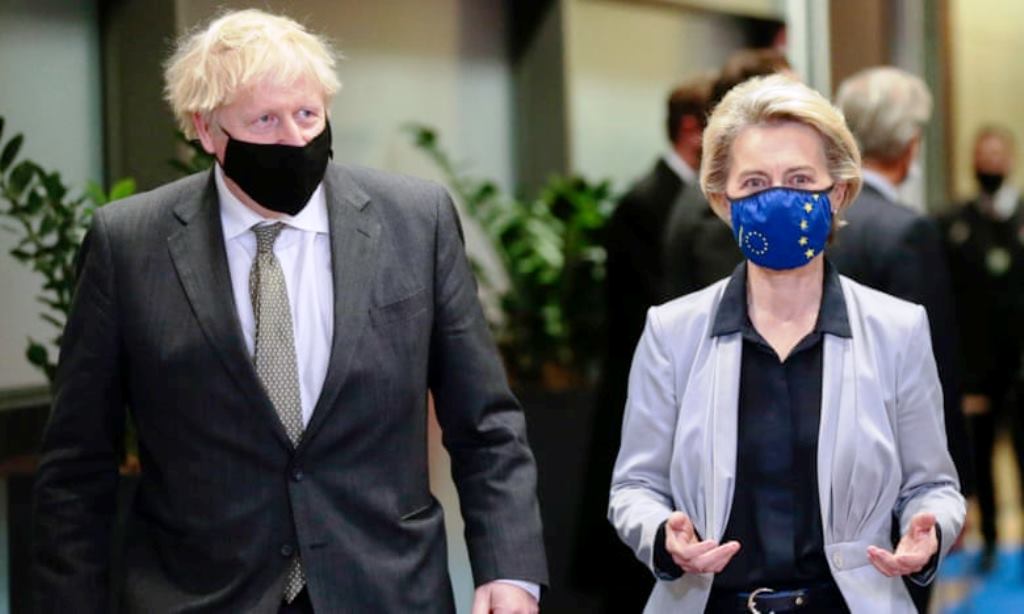What happened on Wednesday night?
Boris Johnson and the European commission president, Ursula von der Leyen, met in person over a three-hour scallop and turbot dinner to try to unlock the Brexit trade negotiations deadlock. As expected, both sides agreed to continue talking – but they agreed that the gaps between their positions remain wide.
Can we read anything into the language of their statements?
Unlike the previous two meetings, there was no joint statement following the leaders’ summit. Some have concluded this is a reflection of the depth of division at the dinner table.
A statement from a Downing Street source was the more pessimistic of the two, stating “very large gaps remain between the two sides and it is still unclear whether these can be bridged”. Von der Leyen stated more positively that “we gained a clear understanding of each other’s positions” but added “they remain far apart”.
How does this compare with previous Brexit summits?
The statements are conspicuously different from after last year’s breakthrough meeting in the Wirral between Johnson and Leo Varadkar. The then taoiseach revealed they had found a “pathway to a possible Brexit deal”, and days later a deal was sealed. By comparison, the optics of Wednesday night’s outcome were not good.
Does this mean all hope of a deal is dashed?
No. Both sides have said talks will continue until Sunday and Downing Street said the prime minister was resolved to try to get a deal, saying: “The PM does not want to leave any route to a possible deal untested.”
Is Sunday a firm deadline?
The Brexit trade talks have been punctuated by at least four formal deadlines laid down by either the EU or the UK. Dominic Raab, the foreign secretary, recently said “never say never” – and indicated that talks could go right up to 31 December, the legal end of the transition period.
Raab told Sky News on Thursday that Sunday will be a “point of finality”, but this could be a hardening of language to ratchet up pressure on the EU to compromise. Some believe the language in the dual statements could be part of a choreographed set-up for a victory to be declared by Johnson.
While the mood in Brussels has been downbeat, according to the Irish foreign minister, Simon Coveney, sources in the EU have been saying in the past few weeks that Brussels would be comfortable with assisting Johnson to deliver what can be painted as a victory to the British public – or more notably his hard Brexit backbenchers – if that is what it takes to seal a deal.
What happens if there is a deal?
Any deal must be approved by EU member states, the European parliament and the British parliament.
Trade deals should be allowed 21 days’ scrutiny in parliament, under the Constitutional Reform and Governance Act 2010. But there is not enough time for that unless MPs were to sit every day including Christmas Day until New Year’s Eve.
Instead, the prime minister is expected to fast-track legislation for the deal and, provided he gets the support of Labour in the form of a vote of support or abstention, the law will sail through.
On the EU side, the European parliament has agreed to sit in a special session on 28 December, but many of the 730 MPs may protest that they do not have time to examine a 700-page document to make an informed decision about their voting preference.
In this scenario, the European council of member state leaders can approve that the deal can be provisionally implemented on 1 January, arguing exceptional circumstances.
What about no-deal planning?
The government has dusted down no-deal contingency plans that had two outings last year – one in preparation for a crash-out on 29 March 2019, and another in October when it appeared that Johnson, as the new Conservative party leader, was prepared to walk out with no deal.
The plans involved putting the army on standby to deal with any problems getting food and medical supplies through ports, and also potential civil unrest.
Planes should be allowed to keep flying and lorries to keep moving in the event of no deal after the European commission set out its contingency plans on Thursday, which would allow aviation and road transport to continue as now for six months from 1 January – as long as the UK government agrees to maintain a “level playing field” in standards.
The Guardian
VIDEO

